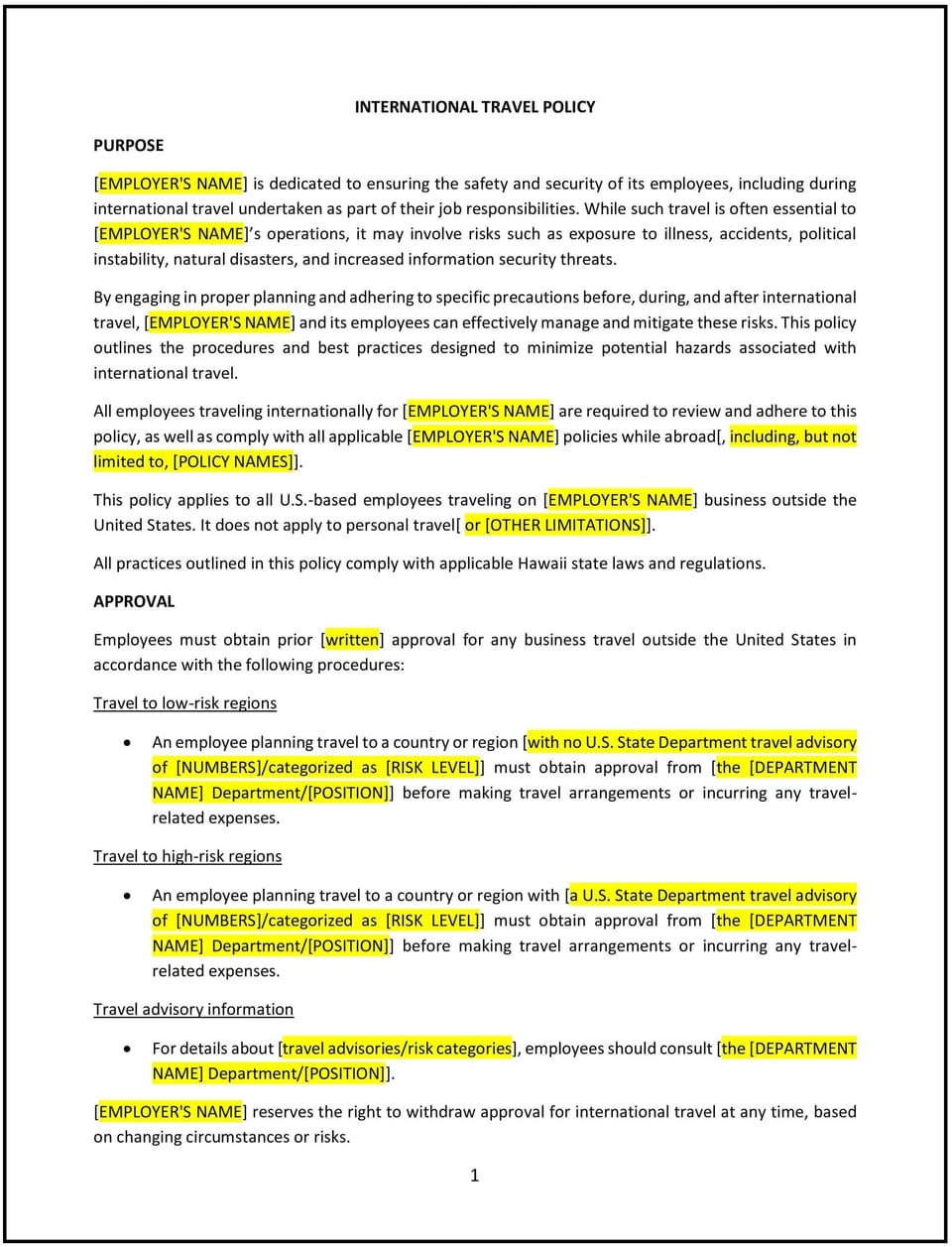International travel policy (Hawaiʻi): Free template

International travel policy (Hawaiʻi)
An international travel policy helps Hawaiʻi businesses establish guidelines for employees traveling abroad for work-related purposes. This policy outlines procedures for planning, approving, and managing international trips, while addressing Hawaiʻi’s unique geographic location and cultural considerations. It is designed to ensure employee safety, manage travel expenses, and support business objectives during international assignments.
By implementing this policy, businesses in Hawaiʻi can provide clear expectations for employees traveling abroad, reduce risks, and ensure smooth and productive international trips.
How to use this international travel policy (Hawaiʻi)
- Define travel approval process: Specify the steps for requesting and approving international travel, including required documentation and approval authority.
- Establish safety protocols: Provide guidelines for ensuring employee safety during international travel, such as registering with the U.S. Embassy, obtaining travel insurance, and staying informed about local conditions.
- Address travel expenses: Outline procedures for managing travel expenses, including allowable costs, reimbursement processes, and per diem rates.
- Include cultural considerations: Emphasize the importance of respecting local customs, laws, and business practices in the destination country.
- Communicate the policy: Share the policy with employees during onboarding and through internal communications to ensure awareness and understanding.
- Train employees: Educate staff on the policy’s guidelines, including safety protocols, expense management, and cultural sensitivity.
- Monitor compliance: Regularly review travel arrangements and expenses to ensure adherence to the policy and address any issues promptly.
- Review and update the policy: Regularly assess the policy’s effectiveness and make adjustments as needed to reflect changes in travel regulations, business needs, or global conditions.
Benefits of using this international travel policy (Hawaiʻi)
This policy offers several advantages for Hawaiʻi businesses:
- Ensures employee safety: Clear safety protocols help protect employees during international travel, reducing risks of accidents or emergencies.
- Manages travel expenses: Structured expense guidelines help control costs and ensure transparency in travel-related spending.
- Supports business objectives: A well-defined policy ensures international trips are aligned with business goals and conducted efficiently.
- Promotes cultural sensitivity: Guidelines for respecting local customs and laws help employees navigate international business environments effectively.
- Reduces risks: A structured policy minimizes the likelihood of legal, financial, or reputational issues arising from international travel.
- Encourages accountability: Employees understand their responsibilities for planning, managing, and reporting on international trips.
- Enhances preparedness: Safety and emergency protocols ensure employees are prepared for unexpected situations while traveling abroad.
Tips for using this international travel policy (Hawaiʻi)
- Communicate the policy effectively: Share the policy with employees during onboarding and through regular reminders, such as emails or training sessions.
- Provide training: Educate staff on the policy’s guidelines, including safety protocols, expense management, and cultural sensitivity.
- Be proactive: Stay informed about global travel advisories and update safety protocols as needed to reflect current conditions.
- Monitor compliance: Regularly review travel arrangements and expenses to ensure adherence to the policy and address any issues promptly.
- Be transparent: Clearly explain the policy’s purpose, benefits, and expectations to employees to build trust and cooperation.
- Review the policy periodically: Update the policy as needed to reflect changes in travel regulations, business needs, or global conditions.
Q: Why should Hawaiʻi businesses adopt an international travel policy?
A: Businesses should adopt this policy to ensure employee safety, manage travel expenses, and support business objectives during international trips.
Q: What should the travel approval process include?
A: The process should include steps for requesting and approving travel, required documentation, and approval authority.
Q: How should businesses ensure employee safety during international travel?
A: Businesses should provide guidelines such as registering with the U.S. Embassy, obtaining travel insurance, and staying informed about local conditions.
Q: How should travel expenses be managed?
A: Businesses should outline allowable costs, reimbursement processes, and per diem rates to ensure transparency and control expenses.
Q: Why is cultural sensitivity important during international travel?
A: Respecting local customs, laws, and business practices helps employees navigate international environments effectively and avoid misunderstandings.
Q: What training should businesses provide to employees?
A: Businesses should educate staff on safety protocols, expense management, and cultural sensitivity to ensure smooth and productive international trips.
Q: How often should the policy be reviewed?
A: The policy should be reviewed annually or as needed to reflect changes in travel regulations, business needs, or global conditions.
This article contains general legal information and does not contain legal advice. Cobrief is not a law firm or a substitute for an attorney or law firm. The law is complex and changes often. For legal advice, please ask a lawyer.


